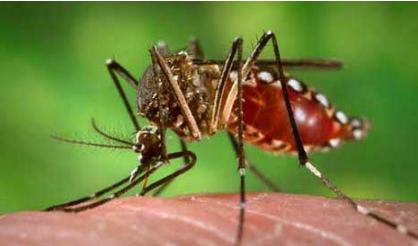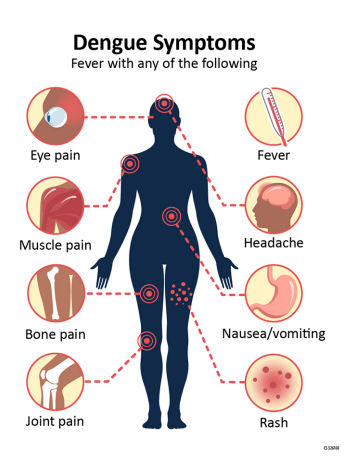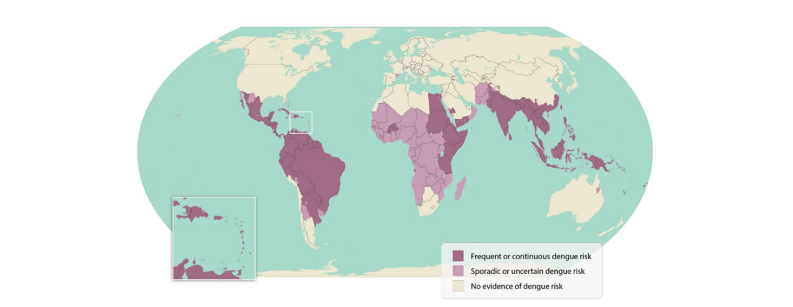Oleh: Thalia Kaylyn Averil
Demam Berdarah Dengue (DBD) adalah penyakit yang ditularkan melalui gigitan nyamuk yang terinfeksi, terutama nyamuk dari spesies Aedes, contohnya Aedes aegypti. Ciri khas dari nyamuk Aedes aegypti adalah ukurannya yang lebih kecil daripada nyamuk rumah dan berwarna hitam disertai bintik-bintik putih. Nyamuk yang terinfeksi membawa virus dengue (DENV) yang kemudian akan masuk ke dalam tubuh manusia melalui gigitannya, terutama nyamuk betina. Dengue virus berkembang biak di usus nyamuk setelah menggigit manusia yang terinfeksi dan kemudian akan menyebar ke jaringan lain, seperti kelenjar ludah. Tempat-tempat yang memiliki air bersih dan dekat dengan pemukiman penduduk (biasanya tidak lebih dari 500 meter) adalah tempat utama perkembangbiakan nyamuk Aedes. Contohnya adalah gentong yang digunakan untuk menyimpan air minum, bak mandi, atau pot, bunga, kaleng, botol, drum, dan ban mobil yang terdapat di taman atau pekarangan yang menampung air hujan. Nyamuk Aedes juga bisa berkembangbiak di tempat-tempat alami, seperti daun talas, daun pisang, tempurung kelapa, tiang bambu, dan lubang pohon yang menampung air hujan. Nyamuk betina lebih mungkin untuk menghisap darah manusia pada siang hari, terutama saat matahari terbit (08.00–10.00) dan menjelang matahari terbenam (15.00–17.00). Tempat nyamuk Aedes beristirahat biasanya di semak-semak atau rerumputan di taman atau perkarangan. Selain itu, barang-barang yang biasanya berada di rumah, seperti pakaian, sarung, kopiah, dan barang lainnya yang digantung juga dapat menjadi tempat peristirahatan nyamuk. Di alam liar, nyamuk betina dewasa diperkirakan berumur 10 hari.

Gambar 1. Nyamuk Aedes aegypti.
Selama 50 tahun terakhir, Indonesia mengalami peningkatan kejadian demam berdarah dengue yang mencapai puncaknya kira-kira setiap 6-8 tahun. Sebaliknya, sejak tahun 1980, angka kematian kasus demam berdarah dengue telah menurun sekitar setengahnya setiap sepuluh tahun. Jumlah rata-rata tahunan kasus tertinggi dilaporkan terjadi di Jawa, disertai dengan Bali dan Kalimantan. Di lain sisi, Papua mengalami angka kejadian terendah dalam beberapa tahun terakhir. Tanda dan gejala yang dialami oleh setiap pasien yang terinfeksi virus dengue berbeda-beda, tetapi yang umum terjadi adalah demam tinggi dengan suhu mencapai 40oC yang berlangsung terus menerus dan ruam atau bintik-bintik merah pada tubuh selama 2–7 hari. Selain itu, tanda dan gejala lainnya yang dapat dialami adalah sakit kepala, mual, muntah, nyeri otot dan sendi, atau rasa sakit yang dirasakan di daerah belakang mata. Tanda dan gejala tersebut biasanya muncul 4–10 hari setelah infeksi. Sebagian besar pasien akan pulih dalam waktu kurang lebih 1–2 minggu, tetapi ada beberapa individu yang mengalami demam berdarah dengue parah sehingga memerlukan perawatan di rumah sakit. Virus dengue juga dapat menyebabkan
terjadinya Dengue Shock Syndrome (DSS) yang disertai dengan hipotensi serta nadi cepat dan lemah. Kerusakan organ dan perdarahan internal dapat terjadi akibat demam berdarah yang parah sehingga dapat berakibat fatal dalam keadaan tertentu dan mungkin menyebabkan kematian. Expanded Dengue Syndrome (EDS) adalah istilah yang digunakan untuk mendeskripsikan demam berdarah yang jarang terjadi, tetapi berpotensi fatal hingga kematian karena menyebabkan masalah pada organ vital.

Gambar 2. Tanda dan gejala yang umum dialami penderita demam berdarah dengue.
Individu yang tertular virus dengue untuk kedua kalinya lebih mungkin untuk mengalami gejala yang lebih parah sehingga perlu segera ditangani oleh tenaga kesehatan. Gejala demam berdarah dengue yang parah sering kali muncul setelah demam mereda, seperti:
- Sakit perut yang luar biasa
- Pernapasan cepat
- Gusi atau hidung berdarah
- Merasa lelah dan gelisah
- Muncul darah di tinja atau muntahan
- Rasa haus yang ekstrim
- Kulit pucat dan dingin
Demam berdarah dengue dapat dicegah dengan menghindari gigitan nyamuk. Nyamuk Aedes tersebar di sebagian besar negara tropis dan subtropis di dunia sehingga Anda harus mengambil tindakan pencegahan ekstra jika Anda tinggal atau sedang mempertimbangkan untuk berlibur ke negara-negara tersebut.
- Menggunakan pakaian tebal untuk menutupi bagian tubuh Anda sebanyak mungkin
karena gigitan nyamuk kemungkinan besar masih dapat menembus pakaian tipis - Tidur di tempat yang ditutupi tirai, jendela, dan pintu serta gunakan AC. Jika tidak
memungkinkan, gunakan kelambu selama tidur. - Menggunakan obat nyamuk yang mengandung salah satu bahan aktif, seperti DEET.
picaridin/icaridin/KBR 3023, IR3535, minyak kayu putih dengan lemon,
para-menthane-diol (PMD), atau 2-undecanone - Cegah nyamuk bertelur di air dengan mengosongkan barang-barang yang menampung air
(seperti ban, ember, tanaman, mainan, kolam, tempat mandi burung, pot bunga, tempat
sampah) seminggu sekali

Gambar 3. Negara-negara berisiko tinggi mengalami demam berdarah dengue (ditunjukkan dengan warna ungu tua).
Pencegahan lainnya yang dapat dilakukan adalah vaksin, yaitu dengan vaksin Dengvaxia dan Qdenga yang tersedia di Indonesia. Vaksin dengue pertama yang ditemukan adalah Dengvaxia dan dapat digunakan oleh anak-anak berusia 9–16 tahun yang sudah pernah terinfeksi virus dengue sehingga dapat melindungi . Vaksin terbaru yang dikembangkan adalah Qdenga dan dapat digunakan oleh pasien berusia 6–45 tahun. Qdenga telah mendapatkan izin edar dari Badan Pengawas Obat dan Makanan (BPOM) pada Agustus 2022. Kedua vaksin merupakan vaksin dengan virus yang dilemahkan sehingga dapat menstimulasi sistem imun tubuh. Jika Anda ingin mendapatkan vaksin dengue, Anda dapat datang ke Rumah Sakit Abdi Waluyo karena vaksin dengue sudah tersedia.
Referensi:
- Harapan H, Michie A, Mudatsir M, Sasmono RT, Imrie A. Epidemiology of dengue
hemorrhagic fever in Indonesia: analysis of five decades data from the National Disease
Surveillance. BMC Res Notes [Internet]. 2019 Jun 20 [cited 2023 Nov 21];12(1):350.
Available from: https://www.ncbi.nlm.nih.gov/pmc/articles/PMC6587249/ - World Health Organization. Dengue and severe dengue [Internet]. Geneva: World Health
Organization; 2023 Mar 17 [cited 2023 Nov 21]. Available from:
https://www.who.int/news-room/fact-sheets/detail/dengue-and-severe-dengue - Center for Disease Control and Prevention. About dengue: what you need to know
[Internet]. Atlanta: Center for Disease Control and Prevention; date of publication
unknown [cited 2023 Nov 21]. Available from:
https://www.cdc.gov/dengue/about/index.html
